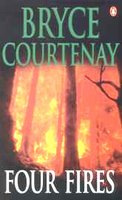
I've just finished Bryce Courtenay's "Four Fires". It was an amazing read really delving into the life of a returned WWII veteran and his family. The story is told through the eyes of a younger son, telling of a poor family dealing with an alcoholic and petty theif of a father, the reputation of their family as the town's garbage collectors and the struggle for the family to gain the respect of the towns-people and feel some sort of self worth.
The story has many themes; woman's rights to study in the 60's, the Australian bush and it's harsh conditions (especially it's bush fires), the bias of the Prodestant and Catholic churches and their effects of their congregations, the amazingly tough environment Australian POWs had to deal with during the Japanese occupation of Singapore, and also the treatment of Vientnam Veterains after their return from war.
It's almost a 'Forrest Gump' type story as each member of the family strikes off to make their way in life and ends up leaving their mark on society, from Melbourne University to the Greek Olympics, from a country prison to the fashion streets of London, from Borneo in 1943 to Vietnam in 1971.
I love Courtenay's writing style, and how he can caputre you up a character so you end up seeing everything through their eyes.
Four Fires does raise a couple of questions in my mind though.
1 - The harshness of the town's Catholic church is clearly presented, and the local priest is a very self righteous and selfish man, as a church today though we may not be so visible in our self righteousnes, do we still give people that impression, and would non-Christians who read this book agree that today's church is still like this?
2 - Tommy (the WWII veteran) is an extremely messed up man, with all he went through as a POW he has become an embarassment to his children, and it is not until his son finally hears the story of the war from his father's eyes does he truely understand his father. Before that he simple thought him a weak, and pitiful man who didn't care about his family, but after the story is told, he finds himself proud of a dad who could handle such things, and understands some of the reasons why he has turned into who he is today - my question is, do we take that first image of someone to heart and not listen to their story to understand why they have become as they are? How can we force ourselves to truely take interest in someone, so we might help them through their problems, and ultimately lead them to Christ?
The book was a very mind provoking read, and the war story left me chilled! It's not for the faint hearted, but is a good secular look at post WWII Australia and the view of it's people on the church.





No comments:
Post a Comment